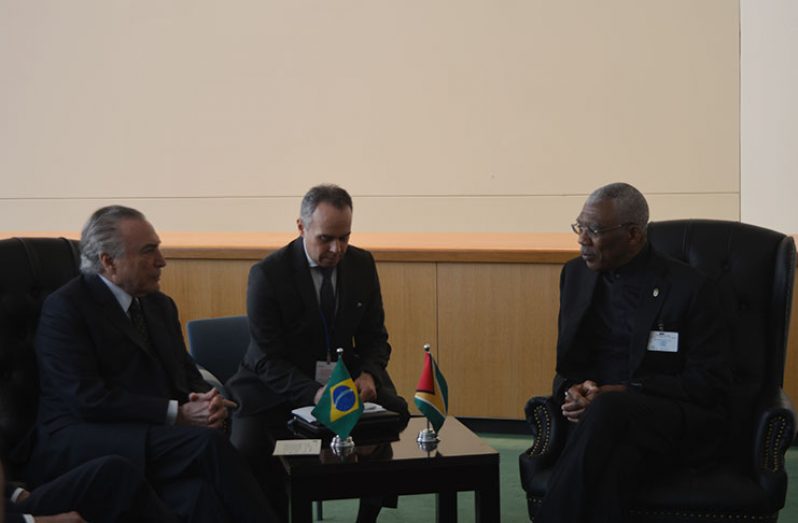By Svetlana Marshall in New York
GUYANA, Brazil and Chile are among more than 50 countries that have signed a new treaty banning the use, development, testing or storing of nuclear weapons under any circumstances.
The world’s first legally-binding treaty prohibiting nuclear weapons opened for signature on Wednesday with President David Granger signing the treaty on behalf of Guyana.
In the Trusteeship Council Chamber at the United Nations Headquarters in New York, President David Granger was accompanied by the Permanent Representative of Guyana to the UN, Ambassador Michael Ten-Pow and Minister of Foreign Affairs, Carl Greenidge.
At the high-level signing ceremony, speakers from international organisations, governments and civil society applauded the move but said there remains much more work to be done to free the world of such arsenals.
“The Treaty on the Prohibition of Nuclear Weapons is the product of increasing concerns over the risk posed by the continued existence of nuclear weapons, including the catastrophic humanitarian and environmental consequences of their use,” UN Secretary-General, António Guterres said at the ceremony, held on the margins of the General Assembly’s high-level debate.
“The treaty is an important step towards the universally-held goal of a world free of nuclear weapons. It is my hope that it will reinvigorate global efforts to achieve it,” he added while alluding to the contributions made by civil society and the hibakusha – the atomic bomb survivors.
However, he was the first to admit that there lies a difficult road ahead, pointing to the fact there remain some 15,000 nuclear weapons in existence.
“We cannot allow these doomsday weapons to endanger our world and our children’s future,” he stressed.
The treaty was adopted on July 7, 2017 at a UN conference with 122 countries voted in favour of it, while one country (Netherlands) voted against it. Singapore abstained.
According to the UN, the nuclear-armed States and most of their allies stayed out of the negotiations. “Immediately following its adoption, the United States, the United Kingdom and France issued a joint press statement saying that they ‘have not taken part in the negotiation of the treaty… and do not intend to sign, ratify or ever become party to it.’”
Meanwhile, shortly after signing the treaty, President Granger engaged in bilateral talks with the President of Brazil, Michel Temer and his delegation. President Granger was accompanied by Ambassador Ten-Pow, Minister Greenidge and the Director General of the Ministry of Foreign Affairs, Audrey Jardine-Waddell.




.png)









